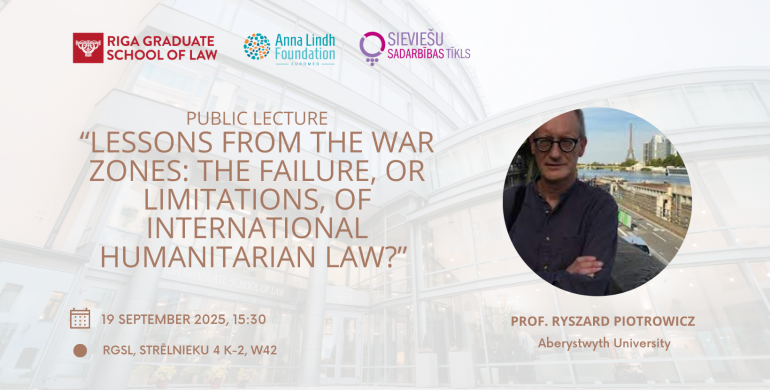We are happy to invite you to a public lecture, "Lessons from the War Zones: The Failure, or Limitations, of International Humanitarian Law?" by Prof. Ryszard Piotrowicz on 19 September at 15:30 at Riga Graduate School of Law campus on Strēlnieku 4 k-2, W42 auditorium.
Please register for the lecture here:
The lecture outline.
“Have you ever stolen a bar of chocolate from a shop? Have you ever stolen someone’s wallet? Have you ever murdered someone? Why did you commit/not commit any of these offences? Because they are against the law?
The conflict in Gaza has caused enormous human pain. Events appear to be totally unregulated and unrestrained. What role does law play in such a situation? The talk will assess the role of law, particularly international humanitarian law, in the conflict, and ask whether we are expecting too much of it. It will assess some of the most serious violations of specific rules designed to protect victims of armed conflicts, and consider the longer-term ramifications, including individual criminal responsibility for war crimes and crimes against humanity. Finally, we must ask: do we expect too much of law?”
Ryszard Piotrowicz has been Professor of Law at Aberystwyth University in Wales since 1999. He previously taught international law at the Universities of Glasgow, Durham, and Tasmania, where he served as Dean of the Law Faculty.
He specialises in Migration Law, Human Trafficking and International Humanitarian Law, and has published extensively in these areas. He has consulted extensively for international organisations, working with the ICRC, UNHCR, EU, OSCE, IOM, ICMPD, and the Council of Europe. From 2008 to 2015, he served two terms as a member of the European Commission’s Group of Experts on Trafficking in Human Beings. From 2013 to 2012, he was a member of the Council of Europe’s Group of Experts on Action against Trafficking in Human Beings (Vice-President, 2017-2020). In 2023-24, he served as a Specialist Advisor to the UK House of Commons Select Committee for Home Affairs' enquiry into human trafficking in the UK.
The lecture is organised in cooperation with NGO Sieviešu sadarbības tīkls and Anna Lindh Foundation.
Sieviešu sadarbības tīkls, or Women’s Cooperation Network, was established in 2003 to coordinate women’s NGOs in Latvia, advocate policy proposals, and promote human rights and civic society development.
The Anna Lindh Foundation (ALF) was established in 2005 as an intergovernmental organisation that brings together civil society entities, institutions, governments, and change-makers from across the Euro-Mediterranean region.

